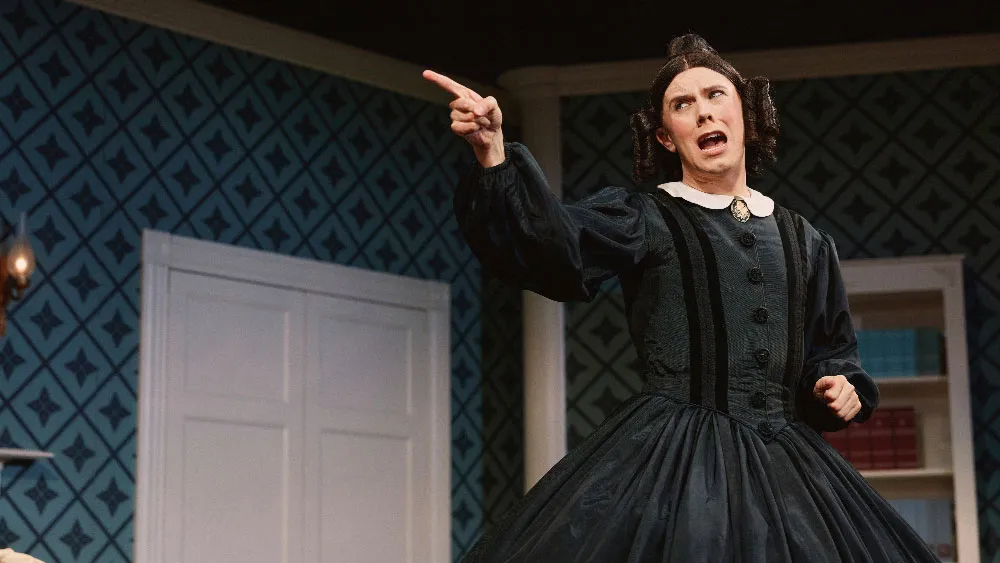December 18, 2020
Review: 'Ma Rainey's Black Bottom' a High Note
Kilian Melloy READ TIME: 3 MIN.
The Netflix film version of "Ma Rainey's Black Bottom" makes for a fine adaptation of the 1982 August Wilson stage work, an early installment in Wilson's ten-play "Pittsburg Cycle." It's also a high note for the stellar cast – including the late Chadwick Boseman, who notches yet another indelible performance in his final role as the young, hot-headed trumpeter Levee, a member of Ma's band who clashes with everyone around him, including the boss herself (played by an equally ferocious Viola Davis).
It's a hot day in Chicago in 1927 as Ma Rainey's band come together at the recording studio run by a producer named Sturdyvant (Jonny Coyne). As Ma's manager Irvin (Jeremy Shamos) runs himself ragged placating the reluctant Sturdyvant and getting the band what they need, Ma herself is in no hurry to show up for the day's work; by the time she does arrive, the band's four musicians – Cutler (Colman Domingo), Toledo (Glynn Turman), Slow Drag (Michael Potts) and, of course, Levee – have had ample time for philosophical arguments and tussles over which songs to play. One major sticking point is whether the band will rehearse Levee's jazzed-up rendition of Ma's hit song – the titular "Ma Rainey's Black Bottom" – or stick with the original arrangement, which Ma prefers, but which Levee dismisses as "jug band" music that won't excite a contemporary crowd.
If tensions are already simmering, Ma's arrival causes things to boil over, starting with her argument with a police officer following a fender-bender in the street outside the studio. It's a nicely-tuned moment that director George C. Wolfe and screenwriter Ruben Santiago-Hudson calibrate with an eye to contemporary America's years-long tension between the Black community and law enforcement, and it's one of several moments sprinkled throughout the film that creates shivers by referencing dark chapters from the African-American experience. (The film opens, for instance, with what initially might seem to be slaves escaping through nighttime woods, with dogs barking in the distance – an impression that's both deliberate and brief, as the moment quickly shifts to the joyous occasion of a Ma Rainey concert in a juke joint.)
Once she's in the studio, Ma loses no time establishing a pecking order that puts her firmly in charge. Her demands grate on Sturdyvant's nerves and present endless challenges to Irvin's diplomatic skills: She's promised her nephew Sylvester (Dusan Brown), a speaking part on the recording of her signature song... despite Sylvester's stutter; she refuses to work until she gets her traditional bottle of Coca-Cola; and she's determined to see Levee get the sack, both for his upstart ways and his eyeballing of dancer Dussie Mae (Taylour Paige), whom Ma Rainey has already claimed for herself.
Though at first she seems little more than a caricature of a diva, Ma Rainey enjoys a quiet moment with Cutler in which she allows a glimpse at her inner life and her need for music to bring her a semblance of order and solace. The blues, she reflects, is "life's way of talking" – something that the penny-counting white men who run the music business don't really comprehend. Her clashes with Levee, of course, stem in large part from Levee's own take on similar sentiments. Having survived his own early traumas at the hands of violent racists, Levee makes music as a challenge to the order of things, whether that order is ordained by God or humanity. Levee sees Ma Rainey's power, understands that it's rooted in her ability to play hardball in a transactional business, and wants her kind of success for himself. It's a tricky act to pull off, though, and Levee – talented as he is – may not have the skill or patience to navigate a fundamentally racist world the way Ma Rainey has.
Like 2016's "Fences" (produced, like this film, by Denzel Washington, who also starred), "Ma Rainey's Black Bottom" never entirely moves away from its theatrical origins, though the film version opens the play up considerably and gives its themes, and its characters, more room in which to move and flex. Propelled by Wilson's electric dialogue (which Santiago-Hudson respects and preserves), the film lives and breathes in the manner of a work crafted for the stage, but possesses enough visual energy – and, even outside of the recording session scenes, musical energy too, thanks to Branford Marsalis' jazzy score – to escape the hermetic, bottled-up quality from which many films adapted from plays suffer.
In a month stuffed with rich offerings, all vying for awards buzz, "Ma Rainey's Black Bottom" rises effortlessly to the top.
"Ma Rainey's Black Bottom" streams on Netflix starting Dec. 18.
Kilian Melloy serves as EDGE Media Network's Associate Arts Editor and Staff Contributor. His professional memberships include the National Lesbian & Gay Journalists Association, the Boston Online Film Critics Association, The Gay and Lesbian Entertainment Critics Association, and the Boston Theater Critics Association's Elliot Norton Awards Committee.
This story is part of our special report: "Streaming Reviews". Want to read more? Here's the full list.


